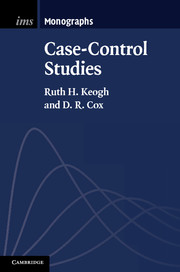Book contents
- Frontmatter
- Contents
- Preface
- Preamble
- Notes
- 1 Introduction to case-control studies
- 2 The simplest situation
- 3 Matched case-control studies
- 4 A general formulation
- 5 Case-control studies with more than two outcomes
- 6 Special sampling designs
- 7 Nested case-control studies
- 8 Case-subcohort studies
- 9 Misclassification and measurement error
- 10 Synthesis of studies
- Appendix: A theoretical diversion
- References
- Index
6 - Special sampling designs
Published online by Cambridge University Press: 05 April 2014
- Frontmatter
- Contents
- Preface
- Preamble
- Notes
- 1 Introduction to case-control studies
- 2 The simplest situation
- 3 Matched case-control studies
- 4 A general formulation
- 5 Case-control studies with more than two outcomes
- 6 Special sampling designs
- 7 Nested case-control studies
- 8 Case-subcohort studies
- 9 Misclassification and measurement error
- 10 Synthesis of studies
- Appendix: A theoretical diversion
- References
- Index
Summary
In two-stage case-control designs, limited information is obtained on individuals in a first-stage sample and used in the sampling of individuals at the second stage, where full information on exposures and other variables is obtained. The first stage may be a random sample or a case-control sample; the second stage is a case-control sample, possibly within strata. The major aim of these designs is to gain efficiency.
Two-stage studies can be analysed using likelihood-based arguments that extend the general formulation based on logistic regression.
Special sampling designs for matched case-control studies include countermatching, which uses some information on individuals in the potential pool of controls to select controls in such a way as to maximize the informativeness of the case-control sets.
Family groupings can be used in case-control-type studies, and there is a growing literature in the epidemiological, statistical and genetics fields. In one approach, cases are matched to a sibling or other relative.
Preliminaries
So far we have discussed case-control studies in which cases and controls are sampled, in principle at random, from the underlying population on the basis of their outcome status. We have also considered extensions, including matched studies and stratified sampling, in both of which it is assumed that some features of individuals in the underlying population are easily ascertained. Sometimes it is useful to consider alternative ways of sampling in a case-control study. In this chapter we discuss some special case-control sampling designs.
- Type
- Chapter
- Information
- Case-Control Studies , pp. 132 - 159Publisher: Cambridge University PressPrint publication year: 2014



